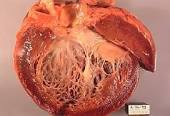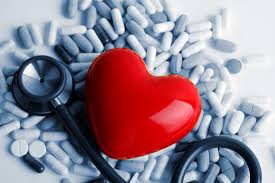
Recently Diagnosed or Relapsed? Stop Looking For a Miracle Cure, and Use Evidence-Based Therapies To Enhance Your Treatment and Prolong Your Remission
Multiple Myeloma an incurable disease, but I have spent the last 25 years in remission using a blend of conventional oncology and evidence-based nutrition, supplementation, and lifestyle therapies from peer-reviewed studies that your oncologist probably hasn't told you about.
Click the orange button to the right to learn more about what you can start doing today.
- You are here:
- Home »
- Blog »
- Multiple Myeloma »
- Heart Health & Multiple Myeloma
Heart Health & Multiple Myeloma

One Third of the Nine Heart Toxins are provided by your oncologist in the form of Chemotherapy, Radiation and/or CT Scans…
A diagnosis of multiple myeloma is a mine field of heart health challenges. Once again, evidence-based non-conventional therapies come to the rescue.
What does it mean for the MM patient’s heart health if your oncologist prescribs three of the most harmful heart toxins on the list below??? To the newly diagnosed MM patient, it means that you must be aware of the possible damage to your heart caused by conventional therapies and how to prevent or manage this damage.
And no, the cardio-toxic therapies did not put my MM into remission. But I did develop chronic atrial fibrillation 15 years after induction therapy, high-dose cytoxan and an autologous stem cell transplant.
The question is, how do manage my heart health now?
Let me provide some background.
A diagnosis of multiple myeloma in early 1994 led to several years of conventional MM therapies including induction chemo, an autologous stem cell transplant, remission, relapse, remission, relapse and an end stage diagnosis.
In December of 2010, more than 15 years after my “safe and effective” FDA approved standard-of-care therapies, I developed chemotherapy-induced cardiomyopathy and chronic Afib.
It took awhile to figure it all out but I now understand that my conventional therapies included therapies that would cause serious damage to my heart.
But when I came across and read the article linked and excerpted below, I couldn’t help but write this blog post riffing on the 9 Heart Toxins and how to avoid them. I mean, do you have to read an article about cocaine being cardio-toxic in order to decide to stop snorting cocaine!?
I don’t use cocaine, ecstasy, ADHD, ED or HIV drugs. I eat a small amount of fish. I detoxify weekly.
That leaves only those therapies or tests prescribed by my oncologist that could be responsible for my
- chronic A-fib,
- reduced ejection-fraction
- and heart damage.
I underwent a lot of chemo, radiation and CT scans over a period of several years. Four of the chemo regimens I took are considered to be cardio-toxic.
I’m sure I’ll need conventional therapies such as ACE inhibitors someday. But currently, I’m managing my heart health without any toxic heart medications by using evidence-based, non-toxic therapies such as:
others.
- To Learn More about Chemotherapy-induced Heart Damage- click now
- To Learn More about Heart Healthy Nutrition- click now
Do you have cardiomyopathy or congestive heart damage? What therapies to you use? How do you manage your heart health?
David Emerson
- MM Survivor
- MM Cancer Coach
- Director PeopleBeatingCancer
Recommended Reading:
- Oncologists Don’t Explain Blood Cancer Diagnosis, Therapies or Side Effects-
- Multiple Myeloma-More Chemo Is Not Better-
- Your Cancer Diagnosis- A How-To Guide
CV admission rates increase among patients with cancer
“Rates for CV admissions among patients with cancer has increased, according to a study published in the European Heart Journal Quality of Care & Clinical Outcomes.
Primary CV admissions are highest among patients with hematological cancer with the most common cause of admission being heart failure, according to the study…
Kobo and colleagues analyzed more than 42.5 million hospitalizations included in the National Inpatient Sample database between 2004 and 2017 with a primary CV diagnosis: acute MI, pulmonary embolism, ischemic stroke, HF, atrial fibrillation/atrial flutter or intracranial hemorrhage.
Of 1,895,823 patients (mean ages, 72 to 79 years) with active cancer diagnosis, 26.1% had hematological malignancy, 18.7% had lung malignancy, 12.4% had gastrointestinal cancer, 11.6% had prostate cancer, 6.7% had breast malignancies and 24.4% presented with other types of malignancies.
During the study period, CV admission rates rose by 23.2% in patients with cancer but dropped by 10.9% in patients without cancer, according to the researchers…
“Our study illustrates increasing cardiovascular health care needs of cancer patients and growing importance of awareness of related issues by the general cardiologist…”
9 Hidden Heart Toxins and How to Avoid Them
Cardio toxins may be in your medicine cabinet, at the doctor’s office, or on your dinner plate.
“Illegal drugs, prescription drugs, and even certain cancer treatments can be toxic to your heart immediately or cause it to fail over time. Toxic means poisonous, and the cardio toxins listed below may weaken heart muscle or damage your heart’s sensitive electrical system.
Although the damage is sometimes reversible if caught in time, a serious brush with a heart toxin can also be fatal.
Here are nine cardio toxins you should know about, and tips for avoiding them or limiting your exposure (managing heart health):
- Cocaine and Your Heart
- Ecstasy and Heart Rhythm
- ADHD Medications and Heart Conditions
- Cancer Chemotherapy and Heart Failure
- Radiation for Cancer Treatment
- Radiation From CT Scans and Heart Damage
- Erectile Dysfunction Drugs and Blood Pressure
- HIV Medication Risks
- Mercury Poisoning From Fish
Play It Safe
If you’re worried that a medication you’re taking, or a treatment you need, may be toxic to your heart, check with your doctor and get the facts. The benefits may outweigh the risks.
The good news is that the effects of cardiotoxicity are often treatable and reversible, notes cardiologist William T. Abraham, Everyday Health columnist and director of cardiovascular medicine at the Ohio State University in Columbus. “Fortunately, discontinuation of a toxic chemotherapeutic agent or illicit drug, and treatment of the heart muscle damage with medications such as ACE inhibitors and beta-blockers can often reverse the damage and restore heart function,” says Dr. Abraham.”
Comprehensive review of cardiovascular toxicity of drugs and related agents
“Cardiovascular diseases are a leading cause of morbidity and mortality in most developed countries of the world. Pharmaceuticals, illicit drugs, and toxins can significantly contribute to the overall cardiovascular burden and thus deserve attention.
The present article is a systematic overview of drugs that may induce distinct cardiovascular toxicity. The compounds are classified into agents that have significant effects on the heart, blood vessels, or both.
The mechanism(s) of toxic action are discussed and treatment modalities are briefly mentioned in relevant cases. Due to the large number of clinically relevant compounds discussed, this article could be of interest to a broad audience including pharmacologists and toxicologists, pharmacists, physicians, and medicinal chemists…”


